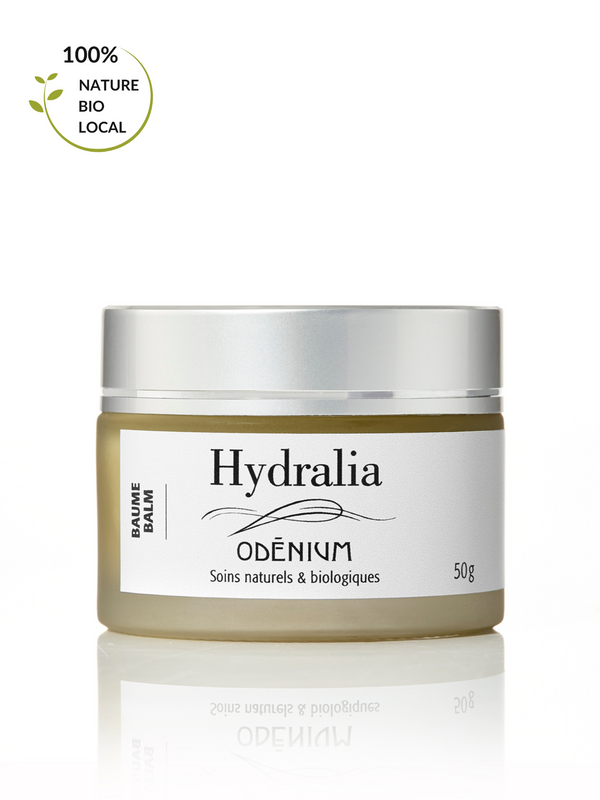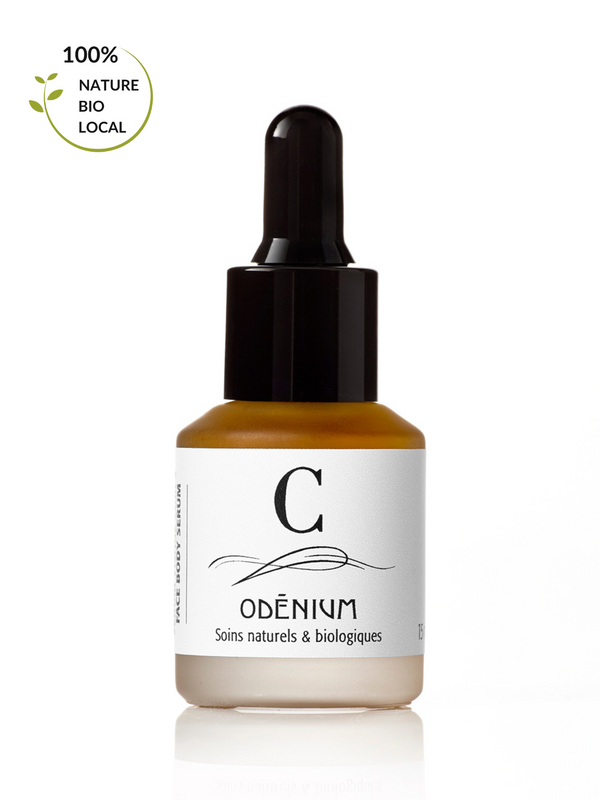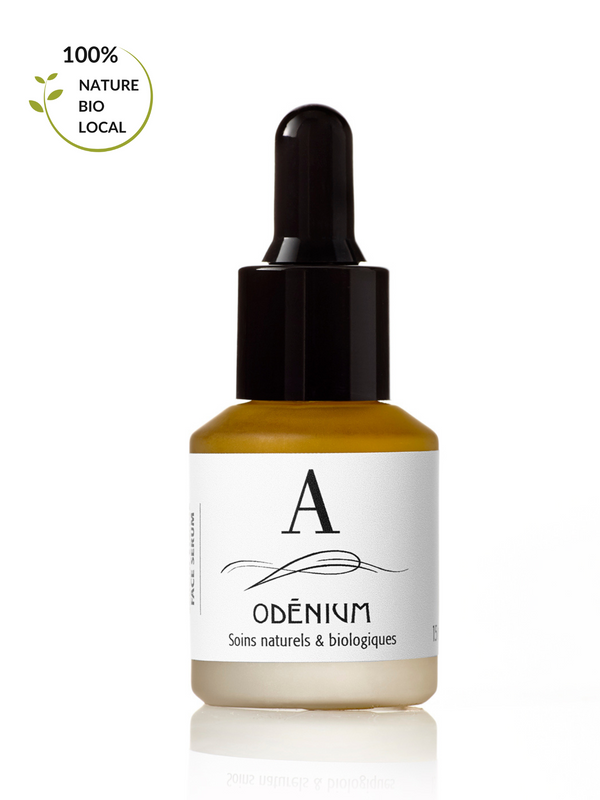ESSENTIAL SKIN VITAMINS

The skin is the largest organ of our body. It plays a crucial role in our overall health. It lives, it breathes, it protects us and it constantly renews itself. To ensure its proper functioning, it is important to take care of it and provide it with essential nutrients, especially vitamins. But which one to choose for my skin type? This is the question we will answer in this article. From vitamin A to vitamin K, these will have no more secrets for you.
Provitamin A or vegetable retinol - The anti-aging ally
What is this?
Provitamin A, which is a precursor to retinol (beta-carotene), is converted into vitamin A (retinol) by the body. It is NOT synthesized naturally by the body, so it needs a sufficient intake through food (veal, chicken, liver, seafood, dairy products, broccoli, spinach, etc.) and through the choice of cosmetics enriched with Provitamin A.
Retinol is found in foods from animal sources and provitamin A in plants.
The benefits for the skin
- Provitamin A stimulates the production of collagen and hyaluronic acid, thus improving theskin elasticity and the curve of the face.
- She participates in thegood-looking effect by eliminating damaged elastin fibers and promoting the formation of new blood vessels.
- She helps to protect the skin environmental factors (pollution, solar radiation) that affect health and appearance.
- It promotes cell renewal of the skin, which reduces pigment spots and helps form a more even and radiant complexion.
Recommended for…
Mature skin and skin damaged by the sun.
More specifically in sea buckthorn, rosehip, jojoba, avocado, cacay, borage oil and in shea butter.
Vitamin B5 - The moisturizer
There are 8 B vitamins, each with its own specificity. They are mainly dedicated to the beauty of hair and skin. Here we focus on vitamin B5.
What is this?
In cosmetics it is called D-panthenol. It is present naturally in the skin and is found in many foods (meat, egg yolk, fish, green vegetables, almonds, etc.).
The benefits for the skin
- Vitamin B5 strengthens the hydrolipidic layer. In other words, it provides better water retention capacity to the skin, which gives it candy and one more great flexibility.
- It allows to give back theskin glow.
- Vitamin B5 allows regeneration of skin cells, hence the interest of using it for the healing.
- It also promotes the skin growth and resistance and mucous membranes.
Sensitive, acne-prone, hyper-reactive skin (psoriasis, dermatitis, etc.).
Mature, dull and tired skin.

Vitamin C - The natural antioxidant
What is this?
Vitamin C is not produced by the body AND it is water soluble, which means it cannot be stored. We must therefore provide our skin with enough of it every day, whether through food (citrus fruits, red fruits, broccoli, kiwi, dried fruits) or by applying facial treatments.
The benefits for the skin
- The skin naturally generates antioxidants that neutralize free radicals that are responsible for skin aging. The older we get, the less the skin generates these antioxidants, it is then that we see the appearance of pigment spots and wrinkles. Vitamin C, thanks to its antioxidant properties, compensates for this decline.
- She also acts as protective barrier against environmental stressors (sun, pollution).
- Vitamin C supports and stimulates the production of collagen giving a skin that looks young, supple and elastic.
- Vitamin C regulates the production of melanin and thus prevents the appearance of Brown stains.
- She comes lighten the complexion, leaving it bright, even and free from signs of fatigue.
All skin types.
Particularly useful for dull skin.
Specifically in avocado and rosehip oils.
Vitamin D - The sunshine vitamin
What is this?
It is also called the sunshine vitamin since it is produced by the body only when exposed to the sun. This is why, especially in winter, it is necessary to compensate with a contribution by food (salmon, tuna, oysters, eggs, mushrooms, etc.), in supplements or in cosmetics.
The benefits for the skin
- The skin is a physical protective barrier against the outside and vitamin D helps to maintain and to strenghten the functions of this barrier. Thanks to its anti-inflammatory properties, it is used in the treatment of different diseases skin (acne, psoriasis, rosacea, dermatitis, etc.).
- It helps fight against free radicals and the oxidative stress they cause when there are too many of them in our body. It thus intervenes in the mechanism of prevention of certain skin diseases and inflammations.
- It is essential to the cell regeneration process to improve the tissue healing and keep a firm and elastic skin.
Skin with imperfections (acne, rosacea, psoriasis, eczema).
More specifically in avocado and borage oil but also in hemp, jojoba or shea butter.

Vitamin E - The beauty vitamin
What is this?
Vitamin E is also called Tocopherol. It is NOT produced by the body, so it must be supplied to our body either through food (vegetable oils, nuts, avocado, cereals, etc.) or through cosmetics.
The benefits for the skin
- It fights against the harmful effects of the sun on the skin (wrinkles, irregular pigmentation, loss of tone, dehydration, etc.).
- She protects the skin from damage irreversible caused by the presence of free radicals. It also stimulates the collagen production. Thus, it slows down skin aging and maintains the elasticity of the skin.
- Vitamin E contributes to improve the appearance of scars (acne, sunburn, etc.) and stretch marks.
- Once applied, it creates a protective film on the surface of the skin to reinforce the natural barrier of the epidermis and avoid transepidermal water loss (natural phenomenon of evaporation of the water contained in the epidermis).
For dry and fragile skin.
For mature skin.
More specifically in Cacay, sea buckthorn, argan, borage, safflower, avocado and grapeseed oil.
Vitamin F - The soothing
What is this?
Vitamin F is the combination of 2 essential fatty acids for the skin: linoleic acid and linolenic acid. It is NOT synthesized by the body, but it is found in many foods (almonds, chia and hemp seeds, egg yolk etc.) and skin care products.
The benefits for the skin
- It protects the skin barrier and retains water in the skin by strengthening the hydrolipidic barrier.
- She Soothes and calms irritated skin, inflamed and problem areas by helping the skin barrier become healthier and regulating proper cell function.
All skin types.
Specifically for sensitive, dry or problem skin (dermatitis, acne, psoriasis, rosacea, etc.).
Specifically in rosehip, argan, sea buckthorn, safflower and abyssinian oil.

Vitamin K - The revitalizing
What is this?
Vitamin K is a great ally for the skin, particularly vitamin K1 (phylloquinone) for its action on blood coagulation and microcirculation. Vitamin K2 (menaquinone) is appreciated for its action on the flexibility of the arteries. Food is the greatest source of vitamin K (dark green vegetables, seaweed, apples, dates, grapes, figs, etc.).
The benefits for the skin
- Vitamin K improves blood circulation And strengthens blood capillaries. CIt is therefore a vitamin of choice for rosacea and all skin diseases related to the blood system.
- She reduces the appearance of inflammation (buttons) and relieves atopic skin (eczema, psoriasis etc.) or prone to redness (sensitive skin, rosacea, couperose etc.)
- Vitamin K activates the production of collagen, and thus contributes to delay skin aging.
- It improves blood circulation, allowing the skin of the face to regain son glow.
- It promotes cell renewal, so it is very effective for attenuateser the scars especially acne.
Skins with scars.
Sensitive skin and those with redness or vein problems.
More specifically in Safflower, Rosehip, Borage, Avocado and Jojoba oil.
For more information or personalized advice, do not hesitate to contact us. It will be our pleasure to direct you to the products best suited for your skin.




Comments
0 Comments
Leave a Comment